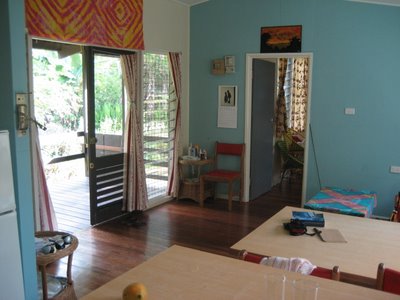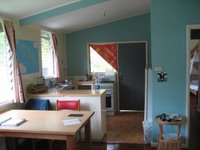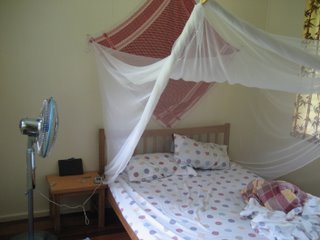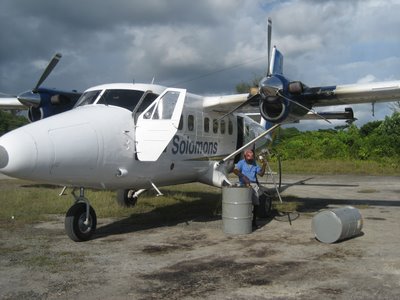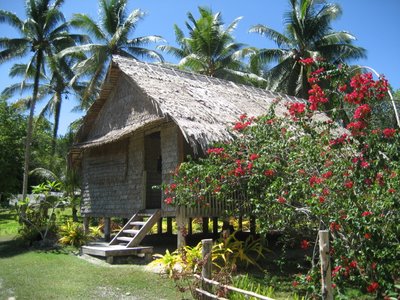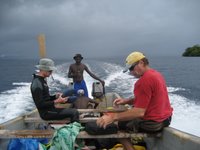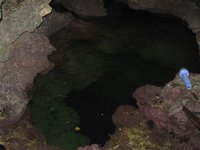 So Luke, a big omni-smiling Polynesian, is fantastically lucky to get the chance for postgraduate studies. I, on the other hand, feel unlucky to have lost such a good friend. Of all the kind souls helping to make me feel welcome in CBSI and to settle in to my new house and neighbourhood, it was Luke and his family who I came to depend on most and with whom I ended up spending most time. I have spent many an evening spent sitting with him, his wife and his four sweet and hilarious little daughters (including little seven year-old Emily, who grinned and said “me save” – I know – when I told her my own sister had the same name?!), watching a film or two and joining the family for dinner. Fascinating too, to hear his tales of Tikopia, the tiny incredibly isolated island where he was born. Tikopia, it is said, is the most traditional of all Polynesian Pacific islands with a tiny population but a surprisingly overt presence in Honiara. The various tribal chiefs have made a decision on behalf of the community to ban any machines, hoping to maintain the traditional village fabric that has existed for thousands of years. I’d be tempted to go, but a boat goes there only once every six months, the journey takes several weeks, and the boat stops for just a couple of days before returning… oversleep on the morning of that return trip and you’ll have six months of deep life contemplation and fish chewing before any chance of heading back to civilisation.
So Luke, a big omni-smiling Polynesian, is fantastically lucky to get the chance for postgraduate studies. I, on the other hand, feel unlucky to have lost such a good friend. Of all the kind souls helping to make me feel welcome in CBSI and to settle in to my new house and neighbourhood, it was Luke and his family who I came to depend on most and with whom I ended up spending most time. I have spent many an evening spent sitting with him, his wife and his four sweet and hilarious little daughters (including little seven year-old Emily, who grinned and said “me save” – I know – when I told her my own sister had the same name?!), watching a film or two and joining the family for dinner. Fascinating too, to hear his tales of Tikopia, the tiny incredibly isolated island where he was born. Tikopia, it is said, is the most traditional of all Polynesian Pacific islands with a tiny population but a surprisingly overt presence in Honiara. The various tribal chiefs have made a decision on behalf of the community to ban any machines, hoping to maintain the traditional village fabric that has existed for thousands of years. I’d be tempted to go, but a boat goes there only once every six months, the journey takes several weeks, and the boat stops for just a couple of days before returning… oversleep on the morning of that return trip and you’ll have six months of deep life contemplation and fish chewing before any chance of heading back to civilisation. Anyway, on Saturday night I gathered with various extended family members and wantak for the inevitable goodbye barbecue. Solomon Islanders take goodbyes very seriously. Perhaps the scattered nature of islands and population has given them the practice. For whatever reason, they have got it down to a fine and well-oiled art. Besides the big spread of food, there are always multiple and wordy speeches, and for the first time I had the chance to join in the fun. I say ‘the chance’, but in actual fact I had no choice in the matter. The matriarch M.C, after picking on various other feet-shuffling men, simply said, “and now William will say a few words”. So William did, though not in Pijin unfortunately.
Anyway, on Saturday night I gathered with various extended family members and wantak for the inevitable goodbye barbecue. Solomon Islanders take goodbyes very seriously. Perhaps the scattered nature of islands and population has given them the practice. For whatever reason, they have got it down to a fine and well-oiled art. Besides the big spread of food, there are always multiple and wordy speeches, and for the first time I had the chance to join in the fun. I say ‘the chance’, but in actual fact I had no choice in the matter. The matriarch M.C, after picking on various other feet-shuffling men, simply said, “and now William will say a few words”. So William did, though not in Pijin unfortunately.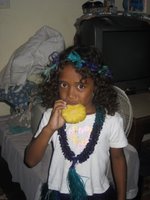 That evening it really struck me that, despite the hardships of life in the Solomons, people here have an amazing attachment to their country. The incredible strength and depth of the family network here, I think, gives people a security and comfort that makes them essentially very happy. As we stood on his balcony, overlooking the Mbokona valley and my own little house almost directly below, Luke said to me with a sigh as a rainstorm broke over the tin roof, “I don’t want to go to Australia you know”. I found something very reassuring in this sentiment. It reminded me that a people and their land are not separate entities. Take a person from their homeland and, though many cultural habits will remain, something is fundamentally changed. For good or for bad, the issue of identity comes to the fore. A travelling Englishman is no longer just an Englishman. He is either definitively ‘an Englishman abroad’ or he can start to absorb the local culture and perhaps, as British colonialists would mutter over G&Ts, ‘go local’. Standing with Luke on his balcony, I think I felt almost as keenly as he did what he was leaving behind. The shops, and pavements, cinemas and first-class education in Canberra are little consolation for the loss of the deep-rooted contentment of ‘belonging’ in the Solomon Islands. It reminded me too of the constant immigration furore in Europe, where among the angry and shrill cries of indignation are the quiet voices urging us to remember the high price people have reluctantly paid in leaving behind their homeland and their own innate sense of identity to come to a foreign land. So goodbye Luke, and good luck, I’ll miss you and your lovely family.
That evening it really struck me that, despite the hardships of life in the Solomons, people here have an amazing attachment to their country. The incredible strength and depth of the family network here, I think, gives people a security and comfort that makes them essentially very happy. As we stood on his balcony, overlooking the Mbokona valley and my own little house almost directly below, Luke said to me with a sigh as a rainstorm broke over the tin roof, “I don’t want to go to Australia you know”. I found something very reassuring in this sentiment. It reminded me that a people and their land are not separate entities. Take a person from their homeland and, though many cultural habits will remain, something is fundamentally changed. For good or for bad, the issue of identity comes to the fore. A travelling Englishman is no longer just an Englishman. He is either definitively ‘an Englishman abroad’ or he can start to absorb the local culture and perhaps, as British colonialists would mutter over G&Ts, ‘go local’. Standing with Luke on his balcony, I think I felt almost as keenly as he did what he was leaving behind. The shops, and pavements, cinemas and first-class education in Canberra are little consolation for the loss of the deep-rooted contentment of ‘belonging’ in the Solomon Islands. It reminded me too of the constant immigration furore in Europe, where among the angry and shrill cries of indignation are the quiet voices urging us to remember the high price people have reluctantly paid in leaving behind their homeland and their own innate sense of identity to come to a foreign land. So goodbye Luke, and good luck, I’ll miss you and your lovely family.
In other news:
- Today is ‘Australia Day’. Why anyone would celebrate the arrival of a boatload of convicts and their unleashing on a wild and beautiful country is beyond me. But don’t question it guys…whip out that garish flag, grab a stubbie, get those coals going, adopt your best Joe Mangle accent, and toast those 19 million Aussies for their infuriating ability to beat us 60 million Brits at any sport they put their mind to.
- This week I bought two new pairs of shoes (see photo). The shoe that looks like 'one of those shoes you wear when you’ve
 got one leg longer than the other' was courtesy of the Central Bank, the first instalment of my forthcoming uniform. The second is preparation for my imminent signing by one of the local football clubs, the latest illustrious and lucky team to follow Mullet Argyle and Monj Too in securing my services
got one leg longer than the other' was courtesy of the Central Bank, the first instalment of my forthcoming uniform. The second is preparation for my imminent signing by one of the local football clubs, the latest illustrious and lucky team to follow Mullet Argyle and Monj Too in securing my services
(Photos from top: Luke, wee Nesta, Emily eating pineapple, me with the fam)

